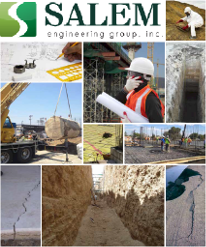“SALEM Engineering Group, Inc.’s team of registered professional engineers bring many years of experience in land development and municipal infrastructure design. With our client’s goals in mind throughout the entire project life cycle, SALEM Engineering Group, Inc. has successfully provided outstanding civil design services for many years.”
Throughout the years, our team has been part of a diverse set of projects, each with their own unique set of challenges. Our team works closely with the client to ensure they are aware of these challenges so that the best decisions can be made to develop a project within budget and on schedule. Our team has a vast knowledge of local, state and federal regulations that guide the design process. Our quality of work speaks for itself and the professionalism we bring is well respected within our client base.
Precise Grading Plans
A precise grading plan is developed to indicate how the site will be graded to divert storm water away from buildings via surface flow. Underground storm drainage pipelines, treatment and infiltrations systems are also designed and shown. Our grading plans also conform to all state and federal ADA standards.
Water Quality Management Plans (WQMP)
This type of plan details how storm water will be contained onsite or treated prior to being discharged offsite. Local and state regulations guide how the various treatment methods should be developed and sized to allow for the expected storm water runoff. Each site brings its own set of unique challenges and our team has developed numerous reports from small to large scale projects.
Hydrology and Hydraulic Studies
These types of studies are used to compare the pre- and post-construction storm water runoff volume. By doing so, our team can better design the site in order to minimize the storm water runoff that may be adversely impact downstream waterways.
Wet Utility Design
Onsite sewer, water and fire main design are required for each project and our team has a great deal of experience in developing these types of plans. Our staff works closely with the developer and his plumbing engineer to ensure that the points-of-connection are coordinated. Local regulations guide the design and layout of wet utilities and our team has worked with many municipalities to develop wet utility plans.
Public Improvement Design
Development projects oftentimes require improvements within the public right-of-way. These improvements include curb, gutter, sidewalk, drive approaches, asphalt concrete pavement, street widening and underground infrastructure improvements. Our team of engineers has worked with several municipalities in order to obtain project approval for our clients.
Underground Municipal Infrastructure
Water, sewer, storm water and irrigation design involve the design of small to large sized mains and pump stations to be able to deliver water and wastewater to their ultimate destination. We have worked with several municipalities and special districts to provide engineering design services for small local mains up to large diameter water and trunk sewer projects.
Erosion Control Plans
An erosion control plan details best management practices (BMPs) that are to be provided during the construction phase to minimize the potential for sediment to leave the construction site and enter the storm water system. Our staff has knowledge of the local and state guidelines that govern the design of erosion control plans.
Traffic Control Plans
Traffic control plans are developed in order to detail how traffic should be handled during construction should a project require work in the public right-of-way. Our staff has worked with local agencies and Caltrans to develop these types of plans that conform to the Manual of Uniform Traffic Control Devices (MUTCD).
Storm Water Pollution Prevention Plans (SWPPP) & Qualified SWPPP Practitioner (QSP) Services
A SWPPP is developed for projects that plan to disturb more than one acre of land during the construction phase. It outlines the requirements and measures that should be in place during the construction phase to minimize the potential for sediment to leave the construction site and enter the storm water system. Projects that require a SWPPP also require coverage under the Construction General Permit (CGP) through the State Water Resource Control Board (SWRCB). Our staff also has several Qualified SWPPP Developers (QSD) who are certified to write SWPPP reports. Our staff also includes several QSPs who are certified to inspect construction sites and develop inspection reports in order to comply with SWRCB requirements.
Related Services

Biological Resources
SALEM utilizes strategically aligned Registered Professional …

Site Assessments and Remediation
SALEM Engineering Group, Inc., has been a leading provider in …

Geotechnical Engineering
SALEM Engineering Group, Inc. offers a wide range of geotechnical …

Land Use Planning
Our team of certified professionals have provided environmental …


